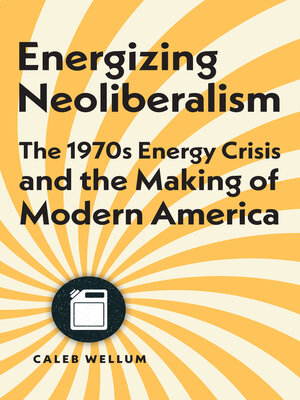Energizing Neoliberalism
ebook ∣ The 1970s Energy Crisis and the Making of Modern America · Energy Humanities
By Caleb Wellum

Sign up to save your library
With an OverDrive account, you can save your favorite libraries for at-a-glance information about availability. Find out more about OverDrive accounts.
Find this title in Libby, the library reading app by OverDrive.



Search for a digital library with this title
Title found at these libraries:
| Library Name | Distance |
|---|---|
| Loading... |
How the 1970s energy crisis facilitated a neoliberal shift in US political culture.
In Energizing Neoliberalism, Caleb Wellum offers a provocative account of how the 1970s energy crisis helped to recreate postwar America. Rather than think of the crisis as the obvious outcome of the decade's "oil shocks," Wellum unpacks the cultural construction of a crisis of energy across different sectors of society, from presidents, policy experts, and environmentalists to filmmakers, economists, and oil futures traders. He shows how the dominant meanings ascribed to the 1970s energy crisis helped to energize neoliberal visions of renewed abundance and power through free market values and approaches to energy.
Deeply researched in federal archives, expert discourse, and popular culture, Energizing Neoliberalism demonstrates the central role that energy crisis narratives played in America's neoliberal turn. Wellum traces the roots of the crisis to the consumption practices and cultural narratives spawned by the petrocultural politics of Cold War capitalism. In a series of illuminating case studies—including 1970s energy conservation debates, popular car films, and the creation of oil futures trading—Wellum chronicles the consolidation of a neoliberal capitalist order in the United States through an energy politics marked by anxious futurity, petro-populist sentiment, and financialized energy markets. He shows how experiences of energy shortages and fears of future energy crises unsettled American national identity and power yet also informed Reagan-era confidence in free markets and US global leadership.
In taking a cultural approach to the 1970s energy crisis, Wellum offers a challenging meditation on the status of "crisis" in modern history, contemporary life, and critical thought and how we rely on crises to make sense of the world.







